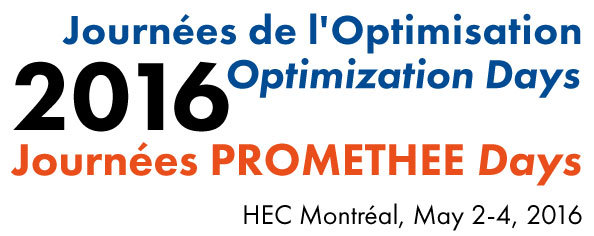
2016 Optimization Days
HEC Montréal, Québec, Canada, 2 — 4 May 2016

TA9 Game Theory in Marketing and Supply Chains
May 3, 2016 10:30 AM – 12:10 PM
Location: Pricewaterhouse Coopers
Chaired by Georges Zaccour
4 Presentations
-
 10:30 AM - 10:55 AM
10:30 AM - 10:55 AMQuality effects in different advertising models - An impulse control approach
In this paper, we integrate quality as a control variable in three classical dynamic optimal control models of advertising, namely, Nerlove-Arrow, Vidale-Wolfe and Ozga models. We assume that decisions in quality improvement can only be made at some exogenously given instants of time, and consequently we use the formalism of impulse optimal control to determine optimal advertising and quality investments. We report numerical results for the three models and discuss the impact of adding quality on the results.
-
 10:55 AM - 11:20 AM
10:55 AM - 11:20 AMImpact of regulations and horizontal integration on manufacturer profitability
In this research, the impacts of horizontal integration and Extended Producer Responsibility (EPR) on manufacturer’s profit and social welfare is investigated. New and remanufactured products are imperfect substitutes. Original equipment manufacturer could remanufacture or compete with an independent remanufacturer. Supply of returns is limited by former production of new products.
-
 11:20 AM - 11:45 AM
11:20 AM - 11:45 AMOptional-contingent-product pricing in marketing channels
The paper studies a manufacturer-retailer framework where the manufacturer sells a base product in two different formats: (i) a tangible product sold directly to consumers and (ii) a digital format sold via an online retailer. The latter sells also an optional contingent product that the consumer can utilize to consume the digital product. An option for the retailer is to apply a loss-leader pricing strategy on the digital product to support demand of the contingent product. We find that the profitability of the digital product has two contradictory effects on the optimality of such a strategy. Furthermore, by comparing wholesale pricing arrangements with Revenue Sharing Contracts, we find that agency pricing is not always efficient nor pareto-improving. This result is explained by the presence of the contingent product in the market.
-
 11:45 AM - 12:10 PM
11:45 AM - 12:10 PMDeveloping an integrated approach for dynamic pricing and cooperative advertising in a manufacturer-retailer channel with customer behavior modeling
In this research, at first impacts of the national and local advertising of the manufacturer and retailer on myopic and strategic customers are investigated and customer purchasing behavior by considering pricing and advertising policies of the manufacturer and retailer will be modeled.
